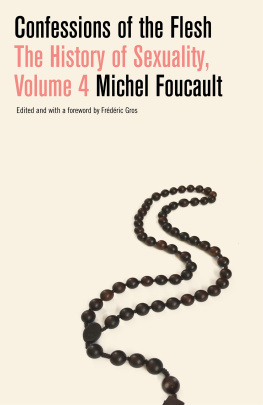Michel Foucault - The History of Sexuality, Volume 3: The Care of the Self
Here you can read online Michel Foucault - The History of Sexuality, Volume 3: The Care of the Self full text of the book (entire story) in english for free. Download pdf and epub, get meaning, cover and reviews about this ebook. year: 1986, publisher: Pantheon, genre: History. Description of the work, (preface) as well as reviews are available. Best literature library LitArk.com created for fans of good reading and offers a wide selection of genres:
Romance novel
Science fiction
Adventure
Detective
Science
History
Home and family
Prose
Art
Politics
Computer
Non-fiction
Religion
Business
Children
Humor
Choose a favorite category and find really read worthwhile books. Enjoy immersion in the world of imagination, feel the emotions of the characters or learn something new for yourself, make an fascinating discovery.

- Book:The History of Sexuality, Volume 3: The Care of the Self
- Author:
- Publisher:Pantheon
- Genre:
- Year:1986
- Rating:3 / 5
- Favourites:Add to favourites
- Your mark:
- 60
- 1
- 2
- 3
- 4
- 5
The History of Sexuality, Volume 3: The Care of the Self: summary, description and annotation
We offer to read an annotation, description, summary or preface (depends on what the author of the book "The History of Sexuality, Volume 3: The Care of the Self" wrote himself). If you haven't found the necessary information about the book — write in the comments, we will try to find it.
The History of Sexuality, Volume 3: The Care of the Self — read online for free the complete book (whole text) full work
Below is the text of the book, divided by pages. System saving the place of the last page read, allows you to conveniently read the book "The History of Sexuality, Volume 3: The Care of the Self" online for free, without having to search again every time where you left off. Put a bookmark, and you can go to the page where you finished reading at any time.
Font size:
Interval:
Bookmark:
The Care of the Self
Also by Michel Foucault Madness and Civilization: A History of Insanity in the Age of Reason The Order of Things: An Archaeology of the Human Sciences The Archaeology of Knowledge (and The Discourse on Language) The Birth of the Clinic: An Archaeology of Medical Perception I, Pierre Riviere, having slaughtered my mother, my sister, and my brother.... A Case of Parricide in the Nineteenth Century Discipline and Punish: The Birth of the Prison The History of Sexuality, Volumes 1 and 2 Herculine Barbin, Being the Recently Discovered Memoirs of a Nineteenth-Century French Hermaphrodite Power/Knowledge: Selected Interviews and Other Writings, 1972-1977 The Foucault Reader (edited by Paul Rabinow)
The Care of the Self Volume 3 of The History of Sexuality Michel Foucault Translated from the French by Robert Hurley Pantheon Books New York
Translation Copyright @ 1986 by Random House, Inc. All rights reserved under International and Pan-Ameri can Copyright Conventions. Published in the United States by Pantheon Books, a division of Random House, Inc., New York, and simultaneously in Canada by Ran dom House of Canada Limited, Toronto. Originally pub lished in France as Le sauci de sai by Editions Gallimard. Copyright @ 1984 by Editions Gallimard. Library of Congress Cataloging-in-Publication Data Foucault, Michel. The history of sexuality. Translation of Histoire de la sexualite. Includes bibliographical references and index. Contents: v. 1. An introduction v. 2. The use of plea-sure v. 3. The care of the self. 1. Sex customs-History-Collected works. I. Title. HQ12.F6813 1978306.778-51804 ISBN 0-394-41775-5 (v. I) ISBN 0-394-54349-1 (v. 2) ISBN 0-394-54814-0 (v. 3) Manufactured in the United States of America First American Edition
Contents Translator's Acknowledgments Vll PART ONE Dreaming of One's Pleasures Chapter 1 The Method of Artemidorus 4 Chapter 2 The Analysis 17 Chapter 3 Dream and Act 26 PART TWO The Cultivation of the Self 37 PART THREE Self and Others 69 Chapter 1 The Marital Role 72 Chapter 2 The Political Game 81 PART FOUR The Body 97 Chapter 1 Galen 105 Chapter 2 Are They Good? Are They Bad? 112 Chapter 3 The Regimen of Pleasures 124 Chapter 4 The Work of the Soul 133 PART FIVE The Wife 145 Chapter 1 The Marriage Tie 150 Chapter 2 The Question of Monopoly 165 Chapter 3 The Pleasures of Marriage 176 PART SIX Boys 187 Chapter 1 Plutarch 193 Chapter 2 Pseudo-Lucian 211 Chapter 3 A New Erotics 228 Conclusion 233 v
vi Contents Notes 241 Bibliography 257 Index 267
Translator's Acknowledgments My thanks go to Stephen William Foster and to Dennis Hollier for their help with this volume of The History of Sexuality. R.H .. July 1986
I will begin by analyzing a rather singular text. It is a practical work dealing with everyday life, not a work of moral reflection or prescription. Of all the texts that have survived from this period, it is the only one that presents anything like a systematic exposition of the different forms of sexual acts. By and large it does not make direct and explicit moral judgments concerning those acts, but it does reveal schemas of valuation that were generally accepted. And one notes that the latter are quite close to the general principles that, already in the classical epoch, organized the ethical expe rience of the aphrodisia. The book by Artemidorus thus con stitutes a point of reference. It testifies to a perenniality and exemplifies a common way of thinking. For this very reason, it will allow us to measure what may have been uncommon and in part new in the work of philosophical and medical reflection on pleasure and sexual conduct that was undertaken in the same period. 3
I The Method of Artemidorus The Interpretation of Dreams by Artemidorus is the only . text that remains, in full, of a literature that was abundant in antiquity: the literature of oneirocriticism. Artemidorus, writ ing in the second century A.D., himself cites several works that were in use in his day: those of Nicostratus of Ephesus, Panya sis of Halicarnassus, Apollodorus of Telmessus, Phoebus of Antioch, Dionysius of Heliopolis, and the naturalist Alexan der of Myndus.! He makes favorable mention of Aristander of Telmessus, and he refers to the three books of the treatise by Geminus of Tyre, to the five books of Demetrius of Phalerum, and to the twenty-two books of Artemon of Miletus.2 Addressing the man to whom his work is dedicated, a cer tain Cassius Maximus (possibly Maximus of Tyre, or his fa ther/ who he says urged him not to surrender my wisdom to silence), Artemidorus declares that he has not done any thing else but employ himself always, day and night, in the interpretation of dreams.4 An emphatic statement of the sort that was rather customary in this kind of presentation? Per haps. In any case Artemidorus did something quite different from compiling the most famous examples of prophetic dreams that were confirmed by reality. He undertook to write a work of method, and this in two senses: it was meant to be a manual for use in daily practice; it was also meant to be a theoretical treatise on the validity of interpretive procedures. 4
Dreaming of One's Pleasures 5 One should bear in mind that the analysis of dreams was one of the techniques of existence. Since images encountered in dreams, or some of them at least, were thought to be signs of reality or messages of the future, a high value was set on their decipherment; a reasonable life could scarcely dispense with the task. This was a very old popull)r tradition; it was also an accepted custom in cultured milieus. If it was necessary to consult the countless professionals of nocturnal images, it was also good to be able to interpret their signs oneself. There are innumerable testimonies showing the importance accorded the analysis of dreams as a life practice, one that was indis pensable not only in dramatic circumstances but also in the everyday course of events. This was because in dreams the gods gave advice, guidance, and sometimes explicit com mands. Moreover, even when the dream only announced an event without prescribing anything, even when one believed that the concatenation of future occurrences was inevitable, it was still good to have foreknowledge of things that were bound to happen, so that one might prepare for them. Provi dence, says Achilles Tatius in The Adventures of Leucippe and Clitophon, sometimes foreshows the future to men in dreams, not so that they may be able to avoid the sufferings fated for them, for they can never get the better of destiny, but in order that they may bear them with the more patience when those sufferings come; for when disasters come all together and unexpectedly, they strike the spirit with so severe and sudden a blow that they overwhelm it; while if they are an ticipated, the mind, by dwelling on them beforehand, is able little by little to turn the edge ofsorrow.5 Later, Synesius will express a completely traditional point of view when he re marks that our dreams constitute an oracle who dwells with us, who accompanies us if we go abroad; she is with us on the field of battle, she is at our side in the life of the city; she labors with us in the fields and barters with us in the market place; dreams are to be regarded as a prophet who is always ready, a tireless and silent adviser. Hence we should all make
6 The Care of the Self an effort to interpret our dreams, whoever we may be, men and women, old and young, rich and poor, private citizens and public officials, inhabitants of the city and of the country, artisans and orators, without regard either to sex or age, to fortune or profession.6 It was in this spirit that Artemidorus wrote The Interpretation of Dreams. Artemidorus is mainly concerned to show the reader pre cisely how to go about it: How does one contrive to break down a dream into constituent parts and establish its diagnos tic meaning? How does one manage also to take this whole into account in the decipherment of each of its parts? The comparison that Artemidorus makes with the divinatory tech niques of sacrificers is significant: they, too, know how each individual sign fits into the whole, and yet they base their judgments as much on the total sum of the signs as on each individual sign.7 His book is thus a treatise on how to inter pret. Almost entirely centered not on the prophetic marvels of dreams but on the techne that enables one to make them speak correctly, the work is addressed to several types of readers. Artemidorus wishes to supply an instrument for the use of professionals and technicians of analysis. This is the vision with which he hopes to inspire his son, the addressee of the fourth and fifth books: what has been written here, as long as it remains with you alone, will make you a more excellent interpreter of dreams than anyone.8 He also intends to help those who, discouraged by the erroneous methods they have tried, may be tempted to give up this valuable practice. His book will serve as a salutary treatment-therapeia s6teri6des -of those errors.9 But he thinks, too, of the general reader who needs basic instruction.10 In any case, he offers the book as a manual for living, a tool that can be used over the course of one's existence and adapted to life's changing circum stances: just as there is an order and sequence in actual events so he has made an effort to set down everything in an orderly fashion. This handbook-for-daily-living aspect is quite noticeable
Font size:
Interval:
Bookmark:
Similar books «The History of Sexuality, Volume 3: The Care of the Self»
Look at similar books to The History of Sexuality, Volume 3: The Care of the Self. We have selected literature similar in name and meaning in the hope of providing readers with more options to find new, interesting, not yet read works.
Discussion, reviews of the book The History of Sexuality, Volume 3: The Care of the Self and just readers' own opinions. Leave your comments, write what you think about the work, its meaning or the main characters. Specify what exactly you liked and what you didn't like, and why you think so.












